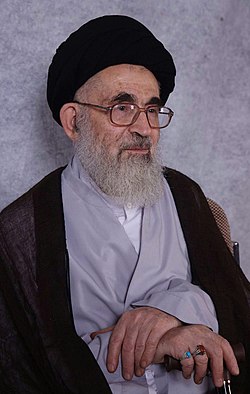Ali Mohammad Dastgheib Shirazi
Grand Ayatollah Sayyid Ali Mohammad Dastgheib Shirazi (Persian: السيد علیمحمد دستغیب شيرازي ) (born 14 March 1935)[1] is an Iranian Twelver Shi'a Marja.[2][3]
Grand Ayatollah Sayyid Ali Mohammad Dastgheib Shirazi | |
|---|---|
 | |
| Born | 14 March 1935 |
| Website | www.dastgheib.ir |
Biography
Ayatollah Dastegheib has studied in seminaries of Qum, Iran under Grand Ayatollah Mohammad-Reza Golpaygani and Ayatollah Ruhollah Khomeini, and also in seminaries of Najaf, Iraq under Grand Ayatollah Abul-Qassim Khoei.[4]
Dastgheib is member of the Assembly of Experts, the body charged with selecting and supervising Iran's supreme leader. He is also a prominent supporter of opposition leader Mir Hossein Mousavi.[5]
Ghoba Mosque issue
According to the news agency RFERL.org, the Iranian security forces closed the Ghoba Mosque" on January 2, 2010, and did not allow Friday prayers to take place. The Ghoba mosque in Shiraz which is one of the most important in the city, was closed with the aim of "silencing" Ayatollah Dastgheib, who is based there and who has "used the mosque as a platform to deliver sermons fiercely critical of the Islamic republic's current regime".[5]
Aiding Syrian Government
Dastgheib has reportedly questioned government strategy of aiding the Syrian government against protesters. During a 23 June 2011 Quranic interpretation session at the Qoba mosque in Shiraz he urged that Iran's resources be saved for Iranians, and asking
“Where should the public wealth that could make this country one of the best in the world be spent? Should it be sent to Syria, so they can oppress the people?”[6]
Notes
- This Dastgheib is not that Dastgheib rajanews.com
- Official Website Archived 2010-01-05 at the Wayback Machine
- "The list of marjas in Persian". Archived from the original on 2009-07-24. Retrieved 2010-01-04.
- in Persian
- Iranian Officials Close Opposition Ayatollah's Mosque. rferl January 04, 2010
- How Iran Keeps Assad in Power in Syria Archived 2012-03-20 at the Wayback Machine| Geneive Abdo| 29 August 2011